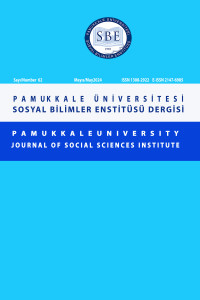ECONOMIC-POLITICAL APPROACHES IN CLASSICAL SOCIOLOGY: COMPARATIVE ANALYSIS OF VALUE AND MONEY WITHIN PHILOSOPHY OF MONEY AND CAPITAL
Öz
This study focuses on the theoretical possibilities created by reading together the works of two important representatives of classical sociology, Marx and Simmel, Capital and Philosophy of Money. Although the directions of both works lead in different directions, they contain a lot of common ground on which we can compare both methodologically and theoretically. In terms of Simmel's methodology, the phenomena of social life, that is, forms of interaction, are evaluated as truths in themselves. In his methodology, although Marx analyzes the truth of phenomena in themselves, he focuses on the content of these phenomena and the relations between this content and form. This methodological distinction also determined the theoretical distinction routes of thinkers towards the concept of value. For Simmel, value emerges in the relationship between the subject and the object to which his desire is directed. For Marx, although value carries the contextual influence of some social-historical and even spiritual elements, it ultimately represents an objective content that points to human labor. It offers the opportunity to make a relational value analysis with labor-value and surplus-value theories.
Kaynakça
- Bahçe, S. (2018). Marksoloji mi Marksizm mi? Kapital’in İzinde, Mülkiye Dergisi, 42 (1), 145-162
- Barbon, N. (1696). A Discouse on coining new money lighter. In answer to Mr. Locker’s consideration etc. London
- Bocutoğlu, E. (2012). İktisat Teorisinde Emeğin Öyküsü, Emek ve Toplum Dergisi, Cilt 1, Sayı 1
- Harvey, D. (2010). Marx’ın Kapital’i İçin Kılavuz, Çev: Bülent O. Doğan, İstanbul: Metis Yayınları
- Klein, N. (2012). No Logo (Çev: Nalan Uysal), Ankara: Bilgi Yayınları
- Lipietz, A. (1993). Uluslararası İş bölümünde Yeni Eğilimler: Birikim Rejimleri ve Düzenleme Tarzları, Toplum ve Bilim Dergisi, 56 (1), 51-73
- Marx, K. (2011). Kapital, Ekonomi Politiğin Eleştirisi, I. Cilt, Çev: Mehmet Selik, Nail Satlıgan, İstanbul: Yordam Kitap
- Mila Canto N. (2005). Sociological Theory of Value, Georg Simmel’s Sociological Relationism, New York: Columbia University Press
- Ollman, B. (2019). Diyalektiğin Dansı, Marx’ın Yönteminde Adımlar. Çev. Cenk Saraçoğlu. İstanbul: Yordam Kitap
- Öngen, T. (1996). Prmotheus’un Sönmeyen Ateşi: Günümüzde İşçi Sınıfı, İstanbul: Alan Yayıncılık
- Sayer, A. (1992). Method in Social Science: A Realist Approach, New York and London: Routledge
- Simmel, G. (2012). Paranın Felsefesi, Çev: Yavuz Alogan, Öykü Didem Aydın, İstanbul: İthaki Yayınları
LASİK SOSYOLOJİDE EKONOMİ-POLİTİK YAKLAŞIMLAR: KAPİTAL ve PARANIN FELSEFESİ’NDE DEĞER VE PARANIN KARŞILAŞTIRMALI ANALİZİ
Öz
Bu çalışma, klasik sosyolojinin iki önemli temsilcisi Marx ve Simmel’in, Kapital ve Paranın Felsefesi eserlerini bir arada okunmasının yaratacağı kuramsal imkanlar üzerine odaklanmaktadır. Her iki eserin istikametleri başka yönlere doğru yol alsa da hem metodolojik hem de kuramsal açıdan karşılaştırma yapabileceğimiz çokça ortak zemin içermektedir. Simmel’in metodolojisi açısından toplumsal yaşamın görüngüleri, yani etkileşim formları, kendinde hakikatler olarak değerlendirilir. Marx ise metodolojisinde, görüngülerin kendinde hakikat hallerini analiz etse de bu görüngülerin içeriğine ve bu içerik ile formun ilişkilerine odaklanır. Bu metodolojik ayrım, düşünürlerin değer mefhumuna yönelik kuramsal ayrım güzergahlarını da belirlemiştir. Simmel açısından değer, özne ile onun arzusunun yöneldiği nesne arasındaki ilişkide ortaya çıkar. Marx açısından ise değer, toplumsal-tarihsel ve hatta manevi birtakım unsurların bağlamsal etkisini taşısa da nihayetinde insan emeğini işaret eden nesnel bir içeriği temsil eder. Emek-değer ve artı-değer teorileri ile ilişkisel bir değer analizi yapabilmemizin olanaklarını sunar.
Kaynakça
- Bahçe, S. (2018). Marksoloji mi Marksizm mi? Kapital’in İzinde, Mülkiye Dergisi, 42 (1), 145-162
- Barbon, N. (1696). A Discouse on coining new money lighter. In answer to Mr. Locker’s consideration etc. London
- Bocutoğlu, E. (2012). İktisat Teorisinde Emeğin Öyküsü, Emek ve Toplum Dergisi, Cilt 1, Sayı 1
- Harvey, D. (2010). Marx’ın Kapital’i İçin Kılavuz, Çev: Bülent O. Doğan, İstanbul: Metis Yayınları
- Klein, N. (2012). No Logo (Çev: Nalan Uysal), Ankara: Bilgi Yayınları
- Lipietz, A. (1993). Uluslararası İş bölümünde Yeni Eğilimler: Birikim Rejimleri ve Düzenleme Tarzları, Toplum ve Bilim Dergisi, 56 (1), 51-73
- Marx, K. (2011). Kapital, Ekonomi Politiğin Eleştirisi, I. Cilt, Çev: Mehmet Selik, Nail Satlıgan, İstanbul: Yordam Kitap
- Mila Canto N. (2005). Sociological Theory of Value, Georg Simmel’s Sociological Relationism, New York: Columbia University Press
- Ollman, B. (2019). Diyalektiğin Dansı, Marx’ın Yönteminde Adımlar. Çev. Cenk Saraçoğlu. İstanbul: Yordam Kitap
- Öngen, T. (1996). Prmotheus’un Sönmeyen Ateşi: Günümüzde İşçi Sınıfı, İstanbul: Alan Yayıncılık
- Sayer, A. (1992). Method in Social Science: A Realist Approach, New York and London: Routledge
- Simmel, G. (2012). Paranın Felsefesi, Çev: Yavuz Alogan, Öykü Didem Aydın, İstanbul: İthaki Yayınları
Ayrıntılar
| Birincil Dil | Türkçe |
|---|---|
| Konular | Sosyal Teori |
| Bölüm | Araştırma Makalesi |
| Yazarlar | |
| Erken Görünüm Tarihi | 16 Mayıs 2024 |
| Yayımlanma Tarihi | 16 Mayıs 2024 |
| Gönderilme Tarihi | 1 Şubat 2024 |
| Kabul Tarihi | 7 Nisan 2024 |
| Yayımlandığı Sayı | Yıl 2024 Sayı: 62 |


